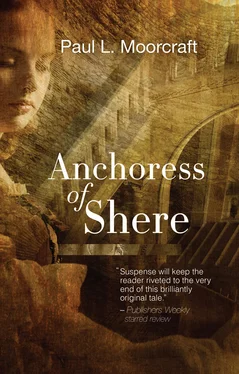Paul Moorcraft - The Anchoress of Shere
Здесь есть возможность читать онлайн «Paul Moorcraft - The Anchoress of Shere» весь текст электронной книги совершенно бесплатно (целиком полную версию без сокращений). В некоторых случаях можно слушать аудио, скачать через торрент в формате fb2 и присутствует краткое содержание. Жанр: Триллер, на английском языке. Описание произведения, (предисловие) а так же отзывы посетителей доступны на портале библиотеки ЛибКат.
- Название:The Anchoress of Shere
- Автор:
- Жанр:
- Год:неизвестен
- ISBN:нет данных
- Рейтинг книги:4 / 5. Голосов: 1
-
Избранное:Добавить в избранное
- Отзывы:
-
Ваша оценка:
- 80
- 1
- 2
- 3
- 4
- 5
The Anchoress of Shere: краткое содержание, описание и аннотация
Предлагаем к чтению аннотацию, описание, краткое содержание или предисловие (зависит от того, что написал сам автор книги «The Anchoress of Shere»). Если вы не нашли необходимую информацию о книге — напишите в комментариях, мы постараемся отыскать её.
The Anchoress of Shere — читать онлайн бесплатно полную книгу (весь текст) целиком
Ниже представлен текст книги, разбитый по страницам. Система сохранения места последней прочитанной страницы, позволяет с удобством читать онлайн бесплатно книгу «The Anchoress of Shere», без необходимости каждый раз заново искать на чём Вы остановились. Поставьте закладку, и сможете в любой момент перейти на страницу, на которой закончили чтение.
Интервал:
Закладка:
On their first encounter, near the ford, Duval exchanged a nod with the young woman. On the second occasion, a week later, Bobby ran up to Marda as she was walking down Rectory Lane and dropped at her feet the stick he was carrying while looking up expectantly. She smiled, picked it up and threw it down the lane.
That gesture was sufficient for Duval to say “hello.”
“What a lovely dog. What’s its name?” responded Marda.
“His name is Bobby. Are you a dog lover?”
“I used to have a dog, when I was a child…it broke my heart when he died.” She patted the dog on the head, and they said their goodbyes.
On the third meeting, three days later, they talked for a minute or two about the weather, while Bobby happily let Marda scratch him behind his ears.
Duval made it his business to walk along the same route at the same time nearly every day, but two weeks passed before they encountered each other again. This time Marda mentioned that she worked for a wine importer and had just returned from a ten-day business trip to France. And, crucially for English social conventions, they exchanged first names. Marda was an outgoing, friendly young woman with the confidence of the naive and a belief in the natural goodness of rural life.
That was the sum of their initial connection, yet Duval was carefully analysing Marda’s potential. He guessed, accurately, that she was in her early twenties. She had well-tended hair, cut to the shoulders in a bob, and was slim and very pretty, at least to Duval. She wore very little make-up, which to Duval was a positive sign. Her voice had a slightly nasal twang which grated on his ears, but she seemed educated and intelligent enough to learn from him. She had an open, fresh complexion and an easy smile. It was the kind of innocence that Duval appreciated.
In his “local,” the White Horse, he had overheard the self-appointed village Lothario say to the landlord, “Dan, have you checked out that smart blond bird I seen walking down past the Old Prison once or twice? Dresses well. Does she come in here somewhen?”
The landlord screwed up his face in concentration. “I think I know who you mean, but she ’asn’t bin in ’ere. Anyway, you’re the expert on the tarts aroun’ Shere.”
His customer took this as due praise. “Mystery she is,” he mused. “Nice bit of skirt, but nobody knows her. Per’aps an ’oliday let in one of the cottages?”
And then the conversation drifted on to football. Despite the distorted consonants and slipped aspirates, which Duval detested, he continued to eavesdrop with intent while feigning patrician indifference, but the conversation remained bogged in the cliched crudities of sports debate. That snatched information confirmed that Marda was not a local-all Duval really needed to know. After a few calls, disguising his distinctive voice, he found out her surname, her address and the company for which she worked. The letting agent for her flat was in Guildford: she had been renting it for almost two months, but she appeared to know no one in the village-Duval presumed that her work overseas kept her from making friends in Shere. Training someone from his own village who roughly matched his medieval vision appealed to his sense of historical perspective, but caution worked against selecting a girl on his own doorstep. He had to be extra careful, although in this case it might be worth a small risk.
The young woman was definitely a suitable case for his special treatment: the right age, probably sufficiently intelligent, fit enough to survive the rigours of confinement, certainly single, and-if he were lucky-even a virgin. Except for her dangerous but convenient proximity, she could well become an apprentice anchoress, real flesh to wrap around the metaphysical skeleton of Duval’s beloved Christine.
Marda Stewart, of course, could not know that she was a potential candidate for a grotesque rapid-immersion course in religion. She regarded herself as not conventionally religious, but she believed in God, maybe a god or even gods. Despite her mother’s former adherence to Rome, Marda had been christened an Anglican, but she had rarely been to a church after leaving school, although she did read a little about Eastern religions. She had always yearned to see faraway places, and her new job as personal assistant to the managing director of Phillips’ Wine Company, despite all the hard work, was very satisfying. Her career had not looked so promising when she left her private girls’ school at the age of eighteen. After a year working as a secretary in Weybridge, she had applied, unsuccessfully, for a job with British European Airways. So she found employment as a nanny in Lyon, where she spent a year improving her French and then moved to Paris. Surviving a variety of odd jobs, she developed a particular interest in food and wine, and finally secured her current job with an English wine importer with headquarters in Guildford. She enjoyed shuttling to and fro between England and France because it made her feel cosmopolitan.
As she was usually at home for less than two weeks in any one month, Marda had lived with her parents in Woking for a while, but at the age of twenty-three she decided it was time to have her own flat. Guildford was the obvious place, but she had fallen in love with Shere’s sleepy, traditional atmosphere during her weekend hikes. The buses were reasonably frequent, and a friend from Guildford, Jenny, sometimes gave her a lift home in her Mini-Cooper, dropping her off at the top of Rectory Lane. It was quicker to walk down the hill rather than go through the centre of the village. And that was how she had bumped into the man with the wonderful voice and friendly dog.
Duval did not know the full biography of Marda Stewart yet; with a grim smile he decided to make it his business to rectify this deficiency.
It would all need planning and precision.
He found it difficult to concentrate in the White Horse, right in the centre of the village, where he felt people were watching him. He sometimes tried the second Shere pub, the Prince of Wales, but the landlady talked incessantly in a loud voice. Up the hill, tucked away in the woods, the King William IV allowed him to relax. Marda’s potential had distracted him-as had a letter from an irritating American, some jumped-up professor who claimed to be an expert on anchoresses. The American had rather impertinently suggested that he should meet Duval during a forthcoming visit to England. The priest disliked uninvited visitors almost as much as he detested Americans and academics.
Duval felt he needed a little pick-me-up. In the dark Hogarthian bar of the William IV, nobody would stare if he pulled out a little jar of honey and added a few drops to his beer. It sweetened it and made it more like the mead of medieval England. Duval relished the taste of his customised drink. He liked to experiment with the flavours, the herbs and the potions of the Middle Ages. At home he could be far more adventurous, adding wormwood, sweet-gale, yarrow, meadow-sweet, cowslip, juniper berries and tree barks to his beer, or sometimes his tea. Despite the dangers, he had tried various permutations of henbane, the weed of witches. But his favourite additive was fly agaric, the red-capped mushroom that grew in abundance around Shere (its white cousin, the “death-cap,” is never tasted twice). The Vikings were said to have spiced their ale with fly agaric before their raids, to put themselves in the right frame of mindlessness, and Duval restricted his usage of the mushroom to the occasions when he needed to be suitably aggressive. Tonight, in the William IV, a little honey in his beer was just fine. Before sipping it, he silently toasted Christine and the imminent arrival of a new companion for her.
Duval started to plan the transformation of Marda’s life. The initial capture was always the trickiest bit, requiring the most specific planning. He thought hard for the best part of an hour; then, having made his decision, he purposefully swallowed the dregs of his customary one pint of beer and walked the twenty minutes from the William IV to his home in a state of controlled excitement. Even Bobby wagged his tail and seemed happy. Duval would be able to write well that evening. Marda Stewart would suffer great emotional pain, but finally she would transcend it, just as Christine had done.
Читать дальшеИнтервал:
Закладка:
Похожие книги на «The Anchoress of Shere»
Представляем Вашему вниманию похожие книги на «The Anchoress of Shere» списком для выбора. Мы отобрали схожую по названию и смыслу литературу в надежде предоставить читателям больше вариантов отыскать новые, интересные, ещё непрочитанные произведения.
Обсуждение, отзывы о книге «The Anchoress of Shere» и просто собственные мнения читателей. Оставьте ваши комментарии, напишите, что Вы думаете о произведении, его смысле или главных героях. Укажите что конкретно понравилось, а что нет, и почему Вы так считаете.












